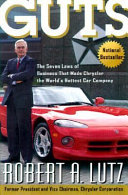
Guts
By - Lutz, A. Robert
Floor
-
Floor 1
Published
-
John Wiley, New York, ©1998
ISBN 10 - 0471357650
ISBN 13 - 9780471357650
Book Status
-
1 Qnty Available with us.
Subject
-
Automobile industry and trade
Shelf No
-
17
Call Number
-
338.7 LUT
Physical Description
-
xiv, 226 pages: illustrations; 24 cm
Notes
-
Includes Index